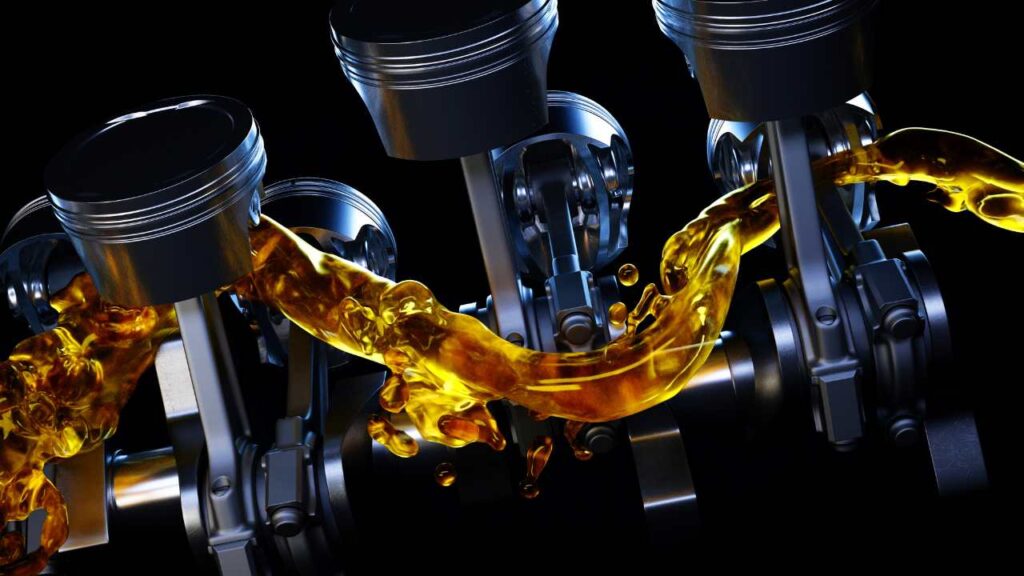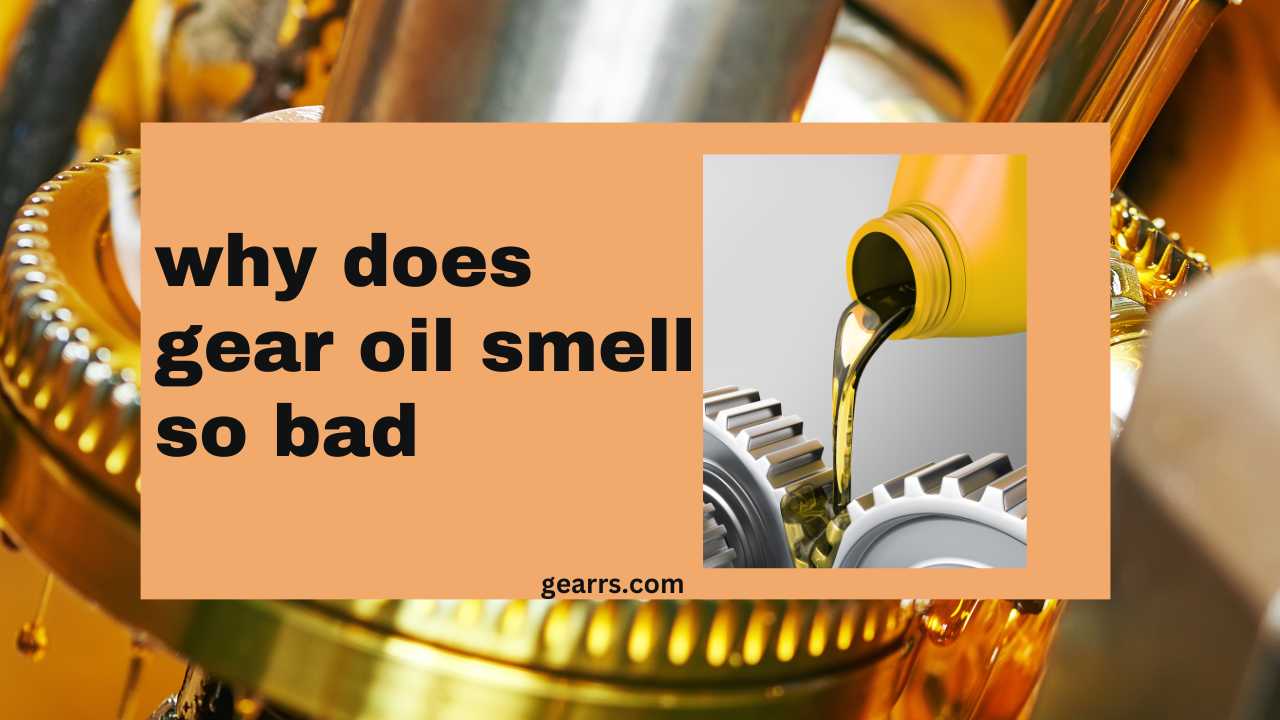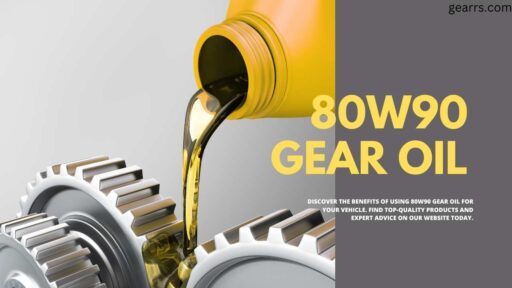Uncover the mysteries of the pungent scent of Why does gear oil smell so bad on our website. Learn about the various factors that cause gear oil to emit such a strong and unpleasant odor.
Ever walked into a mechanic’s shop and been hit by that unmistakable, pungent aroma lurking in the air? Yes, we’re talking about gear oil. It’s a necessary evil in the world of automobiles, but why on earth does it have to smell so wretched?
We’ve all asked that question at some point, wrinkle-nosed, wondering and wishing it weren’t so. But, as with all things in life, there’s a reason gear oil carries such a distinct, unpleasant odor. So, buckle up, friends, as we dive head first into the mystery of ‘Why does gear oil smell so bad’?
“What’s that smell?” is a question you’d never ask again once you’ve had a whiff of gear oil. Its odor is so distinctive that it’s impossible to forget. If more gear-related knowledge this is for you.
The Intriguing Science Behind Why does gear oil smell so bad
Have you ever wondered what’s responsible for that potent sulfur smell when dealing with gear oil? Well, meet the culprits: Mercaptans. These sulfur compounds are an integral part of the additive pack needed for the lubrication of hypoid gears.
This distinctive smell can often be most apparent during longer trips, when towing something heavy, or when your vehicle is heavily loaded. This is primarily due to the main shaft input seal located inside the bell housing behind the clutch, which can often be a significant source of the smell.
But did you know there’s more to the scent of gear oil than it just being a nuisance? It can actually be a very powerful diagnostic tool. The smell can assist in detecting contaminants in lubricating oil samples. Evidence of partial oxidation or hydrolytic degradation, for instance, can give these lube samples a pungent odor that is hard to miss. This odor is also indicative of microbial activity within the oil, leading to the build-up of acids, which can be corrosive to machinery.
However, employing your olfactory sense as a diagnostic tool does have its limitations. Perception of smell can vary from person to person; hence, it may not always be a reliable way of detecting problems. Furthermore, fresh fluids, oils, and grease, even when they meet the manufacturer’s specifications, can still have that signature gear oil smell.
In conclusion, although the smell of gear oil is far from pleasant, understanding the science behind it not only makes it more tolerable but actually quite intriguing. Next time that pungent odor fills your nostrils remember the vital role it plays in protecting your gear system.

Credit: www.pexels.com
Unveiling the Culprits: Key Ingredients Responsible for Gear Oil’s Odor
You’ve probably wondered why your gear oil has such a distinct, often unpleasant aroma. The nose-wrinkling stench is hard to forget, especially if it permeates your vehicle during longer journeys while towing or with a heavy load in the bed. Adding to your discomfort is the knowledge that this smell often signals an issue that needs addressing. But rest easy, dear reader. The olfactory culprit is usually not the gear oil itself but rather specific contaminants or processes happening inside your vehicle.
Key among these is the presence of mercaptans, which are largely responsible for the pungent sulfur smell commonly associated with gear oil. These compounds can aid in identifying contamination in the oil. However, mercaptans alone do not encompass the full gamut of odors. Other chemical reactions or contaminants can also alter the scent of your gear oil.
Oxidation, for instance, can occur either partially or fully, causing your gear oil to give off an senses unpleasant smell. Two common types include hydrolytic degradation and thermal failure oxidation. The former can result in a foul odor due to partial oxidation occurring in your lubricating oil samples. The latter, on the other hand, can lead to a burnt smell due to oil having contact with hot surfaces or undergoing adiabatic compression.
Another possible reason for the off-putting smell is microbial activity in the oil. When microorganisms get into the oil, they can facilitate the build-up of acids that are corrosive to the machinery – an activity that generates its own distinct smell.
Interestingly, the main shaft input seal inside the bell housing behind the clutch may also be the source of the odor, especially if there’s a leakage. This further emphasizes the importance of regularly scheduled vehicle maintenance to prevent such issues from cropping up.
Undeniably, your nose can be a powerful vehicle diagnostic tool. From identifying the presence of an EP additive by odor, to detecting several types of oil contaminants or issues, smell tests can provide you with invaluable and immediate insights. It’s all about harnessing the power of your senses to keep your vehicle running smoothly and efficiently.
The Impact and Importance of Aromatic Hydrocarbons in Gear Oil
Continuing our deep delve into the aromatic world of gear oil, let’s not forget the pivotal role played by these aromatic hydrocarbons in the overall performance of your vehicle’s transmission system. Pungency aside, the very reason these compounds are part of your gear oil’s formulation is tied to the need for robust extreme-pressure lubrication, especially relevant for hypoid gears.
In automotive lingo, hypoid gears refer to the bevel gears present in your vehicle’s drive axles. They face increasing pressure during longer trips, heavy loading, or towing actions, hence demanding a high degree of lubrication under intense force. The sulfuric elements in these hydrocarbons are precisely what makes this possible! By forming a protective barrier on the gear surfaces, they reduce friction between metal parts, enabling smoother operation and improved wear protection.
It is imperative to mention that such aromatic hydrocarbons can undergo partial oxidation or hydrolytic degradation, which is another key source of that characteristic gear oil stench. Notably, this process contributes to a pungent odor – quite similar to rotten eggs – whenever your oil samples are exposed to heat or water. Microbial activity or acid build-ups in your gear oil. It’s almost like every whiff you take under the hood offers a quick health check for your vehicle!
Keep in mind, though, that a burnt smell could be indicative of thermal failure oxidation, a condition caused by contact with hot surfaces or adiabatic compression. This scent is your cue to examine components like the main shaft input seal residing inside the bell housing behind the clutch, a potential source of the odor.
To conclude, the foul smell of gear oil is much more than just an olfactory offense. It’s a deep-rooted part of the functionality, performance, and health diagnostics of your car’s transmission system. So the next time you encounter that distinctive scent, remember it’s telling you something worthwhile.
And yet, this intense aroma serves more purpose than just turning up noses. It can be a powerful diagnostic tool. Identifying specific odors can help you detect potential contaminants, unhealthy.
Challenging the Stench: Effective Ways to Mask the Smell of Gear Oil
Now that you’re well-acquainted with the specifics of gear oil’s notorious scent let’s discuss a few practical strategies to help you tackle it. While completely eliminating the smell might not be feasible due to the nature of the oil, certain methods can indeed lessen its severity, making your work environment more pleasant and agreeable.
One of the most straightforward solutions to minimize unpleasant gear oil odor is to use high-quality oils designed with highly effective deodorizing agents. These well-formulated oils work efficiently to reduce the smells produced during complex car maneuvers like long drives, towing, or when your vehicle is heavily loaded. Always be sure to check the specifications and user reviews before making a selection.
Another method is to employ professional-grade biocides specifically designed to keep oil smelling fresh. These work to combat the bacteria that thrive in oil and cutting fluids, which can often result in an offensive odor. Not only will biocides help address the smell, but they will simultaneously mitigate the risk of acid buildups responsible for corroding machinery. However, please adhere to proper safety measures while using such substances, as they can be toxic if mishandled.
The odor from Why does gear oil smell so bad can also emerge via the main shaft input seal residing behind the clutch within the bell housing. If that’s the case, you may need professional help to replace or fix it. Keep in mind, the odor diagnoses should be harmonized with other symptom analyses, as smell alone can have limitations and vary from person to person.
Besides these, remember that regular maintenance can go a long way. Regularly changing your gear oil can help limit the accumulation of contaminants and, in turn, keep the smell in check. Plus, it’s an excellent way of ensuring the longevity of your machinery.
While the inherent odor of gear oil can’t be completely eradicated, these steps should help mask it effectively. Remember, gear oil’s smell, although pungent, is critical for its performance. Any attempts to reduce its smell should not compromise the oil’s primary protective and lubricating functions. Here’s to a less odor-ridden, yet efficiently running machinery!
Exploring the Future: Are There Odorless Alternatives for Gear Oil?
Let’s dive into the future, shall we? You’ve wrestled with the question, “Why does gear oil smell so bad?” and we’ve delved deep into the science and reasons behind that pungent odor. Now, you may find yourself wondering, “Are there any odorless alternatives out there?”
Currently, gear oil with a sulfur smell is pretty much the standard in the industry. Sulfur compounds are vital parts of the extreme pressure lubrication additive pack that hypoid gears need. These compounds positively impact gear performance, especially under heavy-duty conditions like long trips, towing loads, or when fully loaded.
Nevertheless, the industry is always changing, and new ways to optimize products are being researched while keeping user experience in mind. With the evolution of technology and innovative research, it is plausible to foresee a future where odor-free gear oil could become a reality. However, any alternative would not only need to be odor-free but also retain the exceptional lubricating properties currently provided by sulfur compounds.
Creating an odorless alternative isn’t just about making your garage smell better. There’s a lot at stake in designing such alternatives – they should keep the machinery running smoothly, not let acid build-ups occur due to microbial activity, and prevent wear and tear that might otherwise happen if the lubrication isn’t up to the mark.
Remember, if the source of the smell seems to be coming from the main shaft input seal inside the bell housing behind the clutch, it’s best to consult a professional mechanic.
So, while we wait for the technology to catch up, the least we can do is to find effective ways to mask the smell until such a time that odorless gear oils become a mainstream alternative.
Frequently Asked Questions
Why do different people experience the smell of gear oil differently?
Well, that’s a great question! The perception of smell does vary greatly from person to person, which can lend to unique interpretations of aromas like that of gear oil. Part of this disparity is attributed to individual differences in our olfactory receptors, our body’s sensory system for detecting odors. So, while one person might experience the gear oil smell as overwhelmingly unpleasant, another might find it less offensive or not bothersome at all.
I own a 2003 Frontier V6 Extra Cab 4X4 with a 5-speed gearbox and 165,000 miles. It has no signs of leaks, and the fluids, oils, and grease all meet manufacturer specifications. Yet, why does it smell so bad?
Despite your truck being in excellent condition and maintenance, which is commendable, the strong odor of gear oil can still be noticeable. It’s important to remember that gear oil, irrespective of the vehicle make or model, typically has a strong, distinct smell due to the high concentration of sulfur and other chemical compounds in it. These compounds help reduce wear and tear and achieve high-temperature stability of the gear, but unfortunately, they contribute to its characteristic pungent smell.
Can I use biocides or minimize water ingress as a preventative measure against bad smell?
Absolutely, you can. Bacteria, which often contribute to unpleasant smells, can flourish in the presence of water in gear oil. To counteract this, preventing water ingress is a great move. Additionally, biocides can be effectively used in cutting fluids to inhibit bacterial growth and to help avoid clogging of filters and valves. However, note that these preventative techniques might not entirely mask the intrinsic smell of gear oil caused by its chemical composition.
Are there specific additives that can help reduce the bad smell of gear oil?
Yes, there are ‘odor masking’ additives available in the market that can partly minimize the harsh odors emanating from gear oil. However, a more comprehensive solution to this issue lies in the development of newer, less malodorous chemical compounds that can offer the same performance benefits as sulfur and other traditional gear oil ingredients.
Could the PT100 sensor help in analyzing gear oil smell?
The PT100 sensor specializes in measuring temperature and does not have features for analyzing odors. Odor evaluation is a complex process, often requiring specific analytical-chemical methods or trained human sensory panels to assess organoleptic qualities, including odor. So, while the PT100 sensor may not directly help in analyzing gear oil smell, it can be a valuable tool in monitoring and controlling the temperature of the gear oil during operation.
This is essential as high temperatures can accelerate oxidation and degradation of the oil, leading to increased malodor production. By utilizing the PT100 sensor, users can ensure that their gear oil stays within optimal temperature ranges, minimizing odor development and extending its performance life.
Conclusion Why does gear oil smell so bad
In conclusion, odor is an important aspect to consider when it comes to Why does gear oil smell so bad. With the advancement of technology, we now have tools such as the PT100 sensor that can help in monitoring and controlling temperature to prevent unwanted odors. By utilizing this sensor, users can not only ensure optimal performance of their gear oil but also minimize any potential health hazards or environmental impact from malodor production. It’s crucial for industries and individuals alike to prioritize odor evaluation and management in order to maintain a safe and efficient operation.






